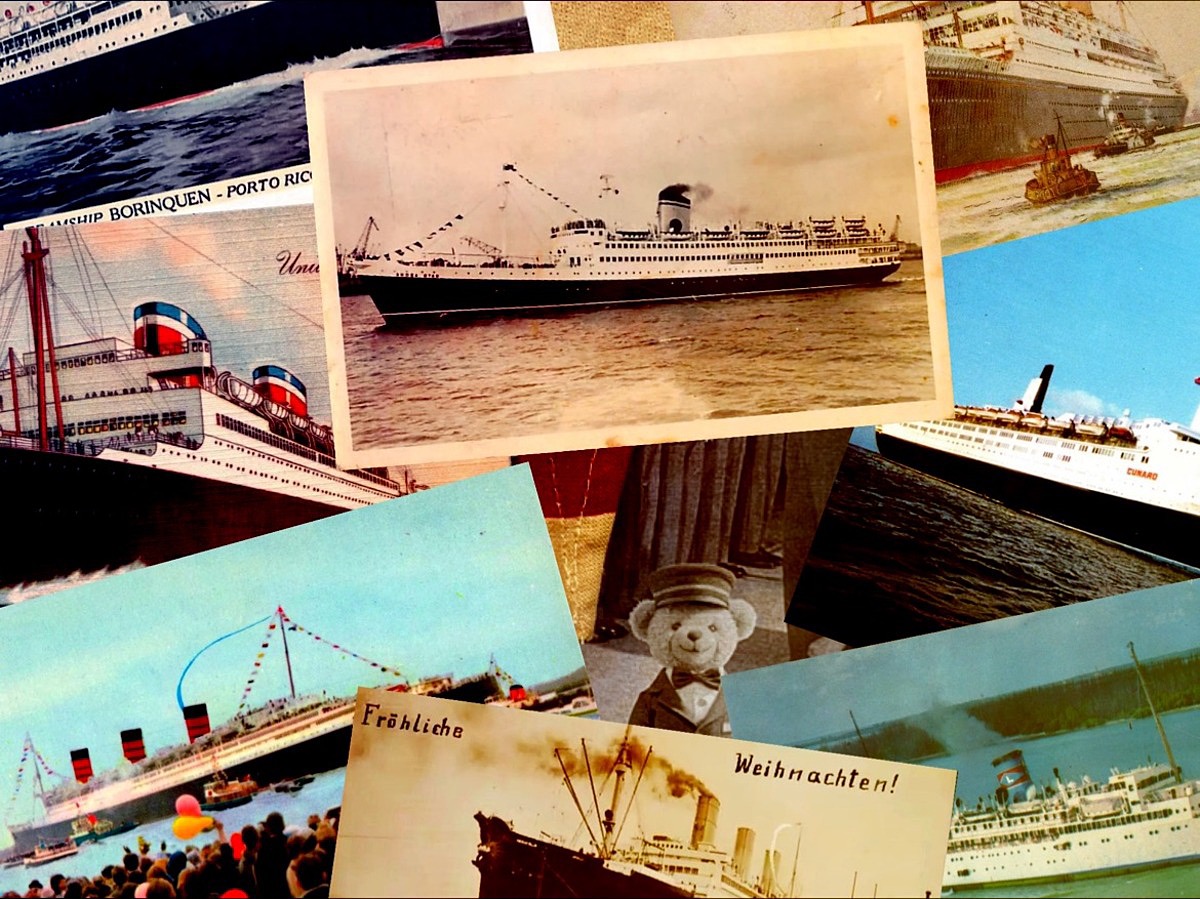Today’s post is going to be a bit different, and I hope it doesn’t come across as too ranty. But it’s been on my mind a lot lately and I wanted to address it.
On May 2, I made a post on my social media pages for the anniversary of QE2’s 1969 maiden voyage. I used this image from a postcard in my collection. We were still on our cruise, and I posted it that morning while sitting in the Norwegian Escape’s atrium as I sipped on an Irish coffee. I thought nothing else of the QE2 post for the rest of the day.

Over the next few days, I received some comments (on Facebook…of course) saying rather snidely that I could’ve at least used an actual image from the maiden voyage. It’s not the first time I’ve gotten comments like this—but this time it really irked me to the point that I just deleted the QE2 post out of pure frustration. For a time, I even debated whether or not I should just delete my Facebook page altogether. I know it shouldn’t have bothered me, but it did nonetheless.
Then I got to thinking: why does it matter?
This question goes two ways. For my part, it doesn’t matter—I know it doesn’t matter. But I’ve always been extremely sensitive to criticism (either real or perceived). It’s something I’ve struggled with for most of my life and will continue to deal with as I get older.
But why does it matter to the commenters? Why should it matter at all?
Just Trolling?
At first glance, it seems like it’s just trolls being trolls. And maybe that is actually the case—there are people who, according to a 2023 study, post “inflammatory, provocative comments with the intention of upsetting others.” I had plenty of those last November when some Edmund Fitzgerald reels I made went mildly viral. I won’t go into trolls’ reasons and motivations here—but it’s a fascinating topic.

And before I go any further, I’ve been doing social media professionally (among other things) for the better part of a decade. I know that trolls are just part of the game. In many ways, I think it’s a sign that you’ve made it when people start trolling you in the comments. But one definitely needs thick skin when dealing with today’s online environment.
In this particular case, though, I don’t think people were necessarily trolling my QE2 post. The ship community is full of very passionate people. A coworker at the Queen Mary once even derogatorily called them “shippies.” Like with any hobby or community—and I’ve seen this with Civil War reenacting, tabletop wargaming, and even Little League baseball—there are some whose interests are so intense that it comes across very negatively.
And that comes to the community’s detriment.
Full Steam Ahead, Together
Before I continue on, I want to say that pretty much everyone I’ve interacted with are sweet, lovely people who genuinely want to share their love of ships with other like-minded individuals. And I think that’s really, really awesome—it’s part of the reason why maritime history has been a lifelong interest of mine. I’ve met some wonderful folks in the last year and a half since resurrecting this blog.
Unfortunately, however, this isn’t always the case. There are some who feel the need to signal superiority by showing that they know more than others or gatekeep. That’s not the only reason for being pedantic of course—this article from the Guardian goes into more detail about that (it’s another fascinating topic!)—but I think that especially rings true for the ship enthusiast community.

Last October, Titanic researcher Matthew DeWinkeleer touched on this when he posted an opinion piece called “To be a Titanic ‘Historian’” on Facebook. I encourage everyone to read the whole post when you’re done here. He writes about the joy, passion, and responsibility that goes with being a Titanic historian (or “researcher” as he prefers), while also criticizing elitism, gatekeeping, and toxic behavior within the community—especially online and among self-proclaimed “experts.”
As DeWinkeleer notes:
One can be scrolling through a Facebook group, happily learning facts and sharing info with other mutual enthusiasts, when they find themselves amid a discussion. But what might start as a spirited but civil debate can descend into toxicity when they find themselves rudely and dismissively confronted by someone proclaiming to be superior for reasons x, y, and z.
DeWinkeleer calls for a more inclusive, open-minded, and supportive environment where contributions—whether books, YouTube videos, digital art, models, and more—are valued equally with formal publications. “The community must be open and welcoming to others to sustain and last in the future,” he adds.
In one comment, someone wrote:
Unfortunately, ego is a cancer in the Titanic community that can damage so much. Things happen and some people just won’t get along with other people. But it is important to remember why we’re all here-to commemorate the 2,208 people who witnessed the sinking of the Titanic.
How true that is. And there’s room for everyone in the Titanic field (and the rest of the ship community). Except for nightmarish AI Titanic content. Just…no.
Be Excellent to Each Other
I recognize that what Matthew DeWinkeleer was writing about is slightly different than what prompted me to write this post. But they’re definitely connected. In any community—not just ship enthusiasts—there are some who feel the need to show off their knowledge or act like they’re better than everyone else for whatever reason.
This isn’t to belittle the vast knowledge that some people possess. Far from it! But if a person is trying to signal superiority and show another that they know more than them, they might be crushing a budding lifelong interest. And that would be a terrible shame.
So what am I trying to say with this blog post? Simply this: be kind and considerate to others. Always.

Leave a Reply